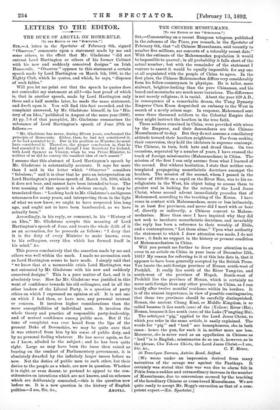LETTERS TO THE EDITOR.
THE DUKE OF ARGYLL ON HOME-RULE. pro THE IDITOR OF THZ "13711CTATOR."] SIR,—A letter in the Spectator of February 6th, signed " Observer," comments upon a statement made by me and some others, to the effect that Mr. Gladstone " did not entrust Lord Harlington or others of his former Cabinet
with his new and suddenly conceived designs" on Irish Home-rule. " Observer" opposes to this statement a certain speech made by Lord Hartington on March 5th, 1886, to the Eighty Club, which he quotes, and which, he says, "disposes of such fables."
Will you let me point out that the speech he quotes does not contradict my statement at all P—the best proof of which is, that in another speech, made by Lord Hartington only three and a half months later, he made the same statement, and dwelt upon it. You will find this fact recorded, and the complaint answered, by Mr. Gladstone himself, in his " His- .lory of an Idea," published in August of the same year (1886). At pp. 7-8 of that pamphlet, Mr. Gladstone summarises the substance of Lord Hartington's speech of June 29th as follows :—
"Mr. Gladstone has never, during fifteen years, condemned the principle of Home-rule. Either, then, he had not considered it, or he had assented to it. But in his position as Minister, he must have considered it. Therefore, the proper conclusion is, that he had assented to it. And yet, though I was Secretary for Ireland, with Lord Spencer as Viceroy, when he was Prime Minister, to neither of us did he convey the smallest idea of such assent."
I assume that this abstract of Lord Hartington's speech by Mr. Gladstone is substantially accurate. It says far more
than I said in the letter which " Observer" considers " fabulous ;" and it is clear that he puts an interpretation on Lord Hartington's previous speech of March 5tb, 1886, which it does not bear, and cannot have been intended to bear. The true meaning of that speech is obvious enough. It may be translated thus : " Looking back to Mr. Gladstone's ambiguous utterances for many years, and interpreting them in the light of what we now know, we ought to have suspected him long ago, and ought not to have been bamboozled, as we have actually been."
Accordingly, in his reply, or comment, in his "History of
an Idea," Mr. Gladstone accepts this meaning of Lord Hartington's speech of June, and treats the whole drift of it as an accusation, for he proceeds as follows : " I deny that it is the duty of every Minister to make known, even to his colleagues, every idea which has formed itself in his mind," &c.
This proves conclusively that the assertion made by me and others was well within the mark. I made no accusation such as Lord Harlington seems to have made. I simply said that " we know that at a memorable crisis Lord Hartington was not entrusted by Mr. Gladstone with his new and suddenly conceived designs." This is a pure matter of fact, and it is absolutely true. How far Mr. Gladstone was justified in this want of confidence towards his old colleagues, and in all the other leaders of the Liberal Party, is a question of party ethics on which I expressed no opinion at all. It is not one on which I had then, or have now, any personal interest or concern. It involves higher considerations than the mere susceptibilities of individual men. It involves the whole theory and practice of responsible party-leadership, and of mutual confidence among public men. But if the tone of complaint was ever heard from the lips of the present Duke of Devonshire, we may be quite sure that it was extorted from him by his sense of public duty, and by no personal feeling whatever. He has never again, so far as I know, alluded to the subject ; and he has been quite right. Large as may have been the issue then raised as bearing on the conduct of Parliamentary government, it is absolutely dwarfed by the infinitely larger issues before us now. Not the duties of public men to each other, but their duties to the people as a whole, are now in question. Whether it is right, or even decent, to pretend to appeal to the con- stituencies on intentions which are not known, and on schemes which are deliberately concealed,—this is the question now before us. It is a new question in the history of English


































 Previous page
Previous page